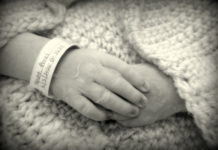The night I attended a well-known rebbetzin’s shiur remains etched in my memory, and it still stings a little even thinking of the incident. Married for a few years, and remembering my daily shiurim with her at seminary, I approached her, not sure if she would remember who I was.
“Sure,” she replied, “How’s the baby?”
My smile faltered, and my shaky voice replied, “No baby.”
“Oops, wrong person,” she murmured, realizing that her comment had hit a nerve. She flashed an apology with her eyes—all she was able to do, as she was surrounded by other women seeking her attention. I walked off, my eyes filled with tears.
When my husband and I started going through the medical challenges associated with infertility, we felt so alone…it literally felt like we were the only ones we knew who were struggling in this way.
I grew up in a household situation where my job was to constantly look at the positive in life, to smooth things over and to not reveal how hurt or bothered I was by different actions of loved ones. This became so much of a habit—always appearing happy for everyone else—that I had fooled everyone, including myself. It was not until I was married, and had been living in Israel for several years, that I truly allowed myself to feel pain and sadness, and to share it with my husband.
It took years for me to recognize the work I needed to do, and I only realized I needed to do this work because of the painful experience of not having children while living in Jerusalem—a space, it seemed, where all of our friends were having babies upon babies, forcing me to face it.
When my husband and I started going through the medical challenges associated with infertility, we felt so alone. An askan met with us and provided reassurance and guidance, but it literally felt like we were the only ones we knew who were struggling in this way. A Shabbos table, hosted by one of my husband’s newly married friends and his young, pregnant wife, where the women’s conversation seemed to focus only on pregnancy complaints and baby apparel, springs to mind. It was all I could do to listen along, as I looked longingly at the guys’ side, which was full of discussion of their rebbeim, and scream inside—How could you be so inconsiderate?!
I felt so isolated until a few close friends and mentors saw my pain and took the time to reveal their own private struggles in the hopes of empathizing with me. And I started realizing that the thoughtless comments were directly from Hashem. I will never forget the neighbor who gave me a ride one day, and as I was getting out of the car, asked about my children. I went inside my house and cried for hours, and I really embraced the pain—something I had never let myself do before. When we met up outside a store later that week, she apologized for her comment, saying she generally knew to be more sensitive, and revealing that although she had several living children, she had also had several miscarriages in between each child. I recognized that her comment must have been made b’siyata d’Shmaya, and that my mission was to continue to embrace the pain. Over the next few years, I took the time and space to heal from certain traumatic events in my life, and to invest myself in mentors, friendships and Torah learning.
Now that I have a child, I am forever grateful for the time my husband and I had without children. However, I wish I had been able to find more support in Israel. When we moved to the United States, I started receiving A Time’s quarterly magazine, full of stories and articles that put my own feelings into words, and I also joined a private Facebook group. A Time also started a wonderful online forum for people to post and receive encouragement from the online community. As I communicated with other religious Jewish women who were on their own fertility journeys, I felt like I was part of a community who really understood my struggle. Only with the encouragement of the women in the group, and other amazing women who spoke honestly with me about their experiences, was I encouraged to attempt medical procedures which I had previously been too scared to try—and I faced them with hope and positivity. It was through certain recommendations in the group that we learned about our final and fabulous doctor and clinic, who provided support and worked with us in every way to lower our out-of-pocket costs. I had spent a lot of time in Israel not reaching out because we had taken pauses in our medical journey, and I did not feel like I could relate to other women. Now I know that pauses and breaks did not mean we were not still on the emotional roller coaster of infertility, and it would have been helpful for me to reach out.
To all those who are reading this and wondering how to support a friend suffering through infertility challenges—just be a friend. There are so many kind and considerate things my friends did for me while we were struggling. The most important thing they did was to share their lives with me—when they were pregnant, they told me, and they made comments about their kids or pregnancies and did not act like they had to walk on tiptoes around me.
I had spent a lot of time in Israel not reaching out because we had taken pauses in our medical journey, and I did not feel like I could relate to other women. Now I know that pauses and breaks did not mean we were not still on the emotional roller coaster of infertility, and it would have been helpful for me to reach out.
As a last thought, we had a lot of offers from well-meaning people—from Shabbos meals to being kvatter at brises. We appreciated all the offers, but please understand if those suffering say no, it may be for a wide variety of reasons, ranging from medical treatments to just needing time without kids running around. I loved hearing my friends talk about their children, as it was part of their lives, but then I was ready to change the subject and hear about everything that did not revolve around children. I understand that it is hard. My husband and I are obsessed with our child too, but hosting college students weekly, we also understand that there is only so much that they can relate to about our child, and so, we find multiple other things to speak about on Shabbos.
I know that as young mothers, a lot of women feel like they can bond with other young mothers and arrange playdates with their children. However, I encourage you to look around in your community and see if you might find an amazing friend who does not fit the typical mold. And if you want to invite them to your Shabbos table, that’s beautiful, but think about who else you are inviting, and even warn them ahead of time so they can prepare—and please make sure they feel included in the discussions at your Shabbos table.











